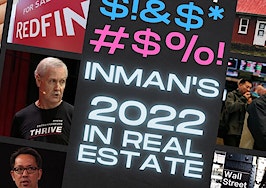This report is available exclusively to subscribers of Inman Intel, a data and research arm of Inman offering deep insights and market intelligence on the business of residential real estate and proptech. Subscribe today.
The storm clouds closed in quickly on real estate in 2022, as a reversal in the Fed’s monetary policy and mounting economic fears removed the tailwinds that had propelled it to unprecedented gains during the early days of the pandemic.
As a result, brokerages and real estate companies entered 2023 a little bruised. Layoffs had become commonplace, record earnings turned into record losses, and expansive blueprints for growth turned into sleek manuals for survival.
However, the industry steadily pushed through obstacle after obstacle during the first six months of the year. Agents, brokerages, leaders and other players seized a slow season to adjust their strategy, get back to basics and gain the strength needed for a rebound some expect could begin by the end of the year.
Here’s a look back at the stories that defined the industry in the first half of 2023.
Mortgage rates giveth, and mortgage rates taketh away
December’s performance offered a silver lining as declines in mortgage rates and inflation encouraged homebuyers to charge through the headwinds of a market correction. January kicked off with that same goodwill, as two consecutive weeks of week-over-week purchase loan request gains and softening home prices gave industry members hope for a relatively robust spring market.
National Association of Realtors Chief Economist Lawrence Yun said mortgage rates’ return to the 6 percent range opened “a gate” for homebuyers to re-enter the market after a steely fourth quarter, and Mortgage Bankers Association Chief Economist Mike Fratantoni shared a similar optimism in a mid-January report.
Even with the boost of a rate decline, January’s existing home, pending home, and new-home sales logged minimal monthly progress alongside hefty annual declines.
Existing-home sales reached their lowest level since 2010, while the pending home sales index failed to reach the 100-level mark for the 10th consecutive month. The new-home market struggled as well, with new residential home sales falling 19.4 percent from January 2022.
However, the Federal Reserve approved a modest 25-basis-point increase on February 1 — a move that sent stocks surging and pushed mortgage rates down to a 2023 low of 5.98 percent. As a result, February’s existing-home sales logged its first monthly gain in a year (+14.5 percent) and pending and new-home sales continued a three-month streak of month-over-month increases.
By February’s end, rates climbed back to 6.64 percent and sent the demand for purchase loans down to the lowest level since 1995.
Rates continued to wildly vacillate throughout March and April, which accelerated monthly and annual losses in the existing home and pending-home market as homebuyers attempted to time the market. The new-home market bucked the trend, with March new residential sales reaching one-year highs in month-over-month growth (+9.1 percent).
Mortgage rate volatility pushed would-be sellers to the sidelines and sent inventory and new listings plummeting well into the spring. In May, new listings declined 19 percent year over year.
“A lot of potential home sales are locked up until mortgage rates come down to a level for which current owners would be willing to trade in their 3 percent rate,” Redfin Deputy Chief Economist Taylor Marr said. “The problem is that’s unlikely to happen anytime soon, as although inflation is steadily coming down from last year’s record-high levels, it’s still above target.”
The reversal of early-pandemic migration trends pushed metro-to-metro home price gaps to 13-year highs, with buyers in pandemic boomtowns taking advantage of double-digit price declines. As a result, May’s existing-home sales eeked out a monthly gain of 0.2 percent — its first since February. Pending sales continued their downward spiral, as new listings and existing inventory declined 27 percent and 6.1 percent year over year, respectively.
June’s metrics have yet to be released; however, an early-month debt ceiling scare, slowly declining inflation, and continuing mortgage rate volatility suggest the summer housing market will be cooler than normal.
Additional reading:
-
-
- The seller’s market is roaring back as buyers vie for limited inventory
- Are you in a seller’s market or a buyer’s market? Take Inman’s quiz
- NAR chief economist: ‘The Fed made a mistake’
- Home prices ticked up in April as market faced a mixed bag
- How this broker-owner got through the last 7 recessions
-
Brokerages continue to streamline for lean times
Buyers and sellers aren’t the only ones who have their backs against the wall as the market settles. The rapid rise in mortgage rates swiftly ended brokerages’ historic winning streaks, which had previously included record-breaking quarterly revenues, impressive market share, robust agent-count growth, and the attention of Wall Street investors who infused companies with millions of dollars in capital to fuel innovation and growth.
The industry’s top brokerages, such as Keller Williams, Redfin, Compass, Side and RE/MAX, ended their year with multiple rounds of layoffs, often in their mortgage and technology departments. The c-suite wasn’t left untouched, with M. Ryan Gorman of Coldwell Banker, Carl Liebert of Keller Williams parent company KWx, and RE/MAX’s Adam Contos all leaving their positions in the midst of a chaotic market shift.
Brokerage losses continued to mark the first and second quarters of 2023 as the real estate commission pool from U.S. existing-home sales remained around $11.6 billion in May — a $3 billion drop from the same month last year, according to an Intel estimate based on numbers tracked by the National Association of Realtors.

Chart by Daniel Houston
The industry’s top publicly-traded brokerages weathered their way through double-digit revenue losses, widening net losses, and freefalling stock prices by focusing on cutting costs, streamlining operations, and adjusting their agent count and market share goals to match current market conditions.
Here’s how some of the major players fared.
Anywhere
Anywhere began the year with a new round of layoffs and the closure of RealSure, something CEO Ryan Schneider said was the result of “products not delivering the same value to consumers” as sales slowed.
From there, Anywhere focused its attention on streamlining its operations, with a series of leadership shakeups. M. Ryan Gorman’s tenure officially ended at Coldwell Banker Realty, with former Compass and SIR executive Kamini Lane stepping in as the 117-year-old brand’s president and CEO.
At the same time, Coldwell Banker Affiliates President Liz Gehringer became Anywhere Franchise Brands president and CEO. Industry titan Sherry Chris retired in April, with Alex Vidal and Ginger Wilcox taking over Chris’ respective duties at ERA and BHGRE.

Compass
Compass kicked off the year with a third round of layoffs and plans to sublease sections of its NYC headquarters on 90 Fifth Ave.
Company leaders continued using a more measured approach to agent count growth, with Compass scooping up a handful of top-producing teams throughout the first two quarters of the year and teasing the possibility of franchising. “Franchising is definitely a more profitable way to grow,” Compass CEO Robert Reffkin said in February.
EXp Realty
EXp Realty started 2023 with a sobering revision to its bold agent count growth goals and founder Glenn Sanford‘s return as CEO. Jason Gesing — who was CEO from 2019 to 2022 — began a new role as chief industry relations officer for eXp World Holdings.
Sanford planned to have 100,000 agents by the end of 2022 but found his company “somewhat stuck” between the 86,000 to 87,000 range. Although eXp failed to break past its plateau in Q1, it still logged a major recruiting win when RE/MAX star Kendall Bonner and her 40-person team joined the brokerage in February.
Keller Williams
Keller Williams’s first and second quarters were filled with legal drama, including two marketing-related class action lawsuits, a continued battle with former CEO John Davis, two lawsuits from former franchisees about Gary Keller‘s alleged “illicit” business tactics, and the bombshell commission lawsuit.
Outside of the courtroom, the Texas-based franchisor placed the pedal to the metal on its recruiting, which focused on reclaiming multi-million and billion-dollar team leaders who’d left during the market heyday.
Keller Williams steadily expanded its international reach with a handful of market center launches in Europe and Asia, pared down its U.S. operations with the sale of Keller Mortgage to Mutual of Omaha, and topped off the spring with another update to KW Command.
RE/MAX
RE/MAX started the year with the launch of MAX/Tech platform powered by kvCORE; its answer to agents’ complaints about its previous tech moves.
Company leaders made technology the main focus during the first quarters of the year, with CEO Nick Bailey using RE/MAX’s 50th R4 conference to outline a bold vision for the franchisor. “We can be 200K agents worldwide,” Bailey said while noting RE/MAX’s tech would be its main recruiting point over the next five years. The brokerage’s sister company, Motto Mortgage, continued record growth despite market headwinds.
Redfin
Redfin began the year by doubling down on its three-year-old luxury division, Redfin Premier. The company extended Premier services to homebuyers and expanded its market reach twice — from 11 to 28 in February and then from 28 to 100 in March.
While the luxury division grew, Redfin continued to make layoffs with 201 real estate support employees and executives losing their jobs at the beginning of April. After the last round of layoffs, CEO Glenn Kelman called corporate employees back to the office. “It has become clearer over the past year that the culture we’ve developed around remote work has been at best good, not great,” he said of the decision to shutter remote work options by July.
Boutique brokerages
As the industry’s largest brokerages focused on cutting costs and quickening their path to profitability, boutique brokerages seized the opportunity to gain market share with hands-on, concierge service.
SERHANT. and Casa Blanca outperformed larger competitors in agent count growth, agent retention, and overall agent count this year and The Agency ticked along with several market expansions and headline-making recruiting wins.
Additional reading:
- Q1 2023 earnings roundup: Has real estate adjusted to the new normal?
- DelPrete: Legacy brokerages can no longer dismiss lower-fee models
- Zillow, Anywhere and Compass vanish from annual Fortune 500 list
- Here’s what agents are pulling down at the top US brokerages
- Meet the boomerang agents returning to their old brokerages
ChatGPT, the fall of iBuyers, and the continued race to build the ‘perfect’ stack
Real estate technology has undergone massive innovation over the past several years, with tech companies and brokerages supercharging their efforts to fully transition the transaction process into the digital age.
ChatGPT
In a matter of months, ChatGPT transformed from a social-media curiosity to a groundbreaking tool that could accelerate the industry’s years-long quest to harness artificial intelligence.
PlanetRE launched a ChatGPT integration for its customer relationship management system in January, enterprise real estate software company RESAAS followed in February with an integration that helped users write engaging property descriptions quickly, and LandOnEarth used ChatGPT to enhance its HomeMatch algorithm in April.
Agents caught the ChatGPT bug and began using it to write website content, craft engaging Instagram and Facebook content, and even do property and neighborhood research. However, as the year trucked along, leaders and agents began to look at the tool with a more critical eye as its shortfalls, such as providing inaccurate information and glaring racial and gender biases, became more evident.
Brokerage leaders including Gary Keller, Nick Bailey, and OJO Labs CEO John Berkowitz spoke about the opportunities and challenges that ChatGPT and other AI-powered platforms offered while championing the irreplaceable skills of agents.
“Will it actually change the very nature of all search?” Keller said during his company’s February Family Reunion, before likening the trend to the trajectory of iBuyers. “I don’t think so. You would have thought the iBuyers, two years ago, were the smartest most brilliant people in the industry.”
iBuyer Fallout
The iBuying industry began the year in dire straits, with Zillow, Redfin and Anywhere all shuttering their iBuying businesses in recent years and turning back to their tried-and-true revenue generators.
The remaining leaders — Opendoor and Offerpad — grappled with ballooning losses and free-falling stock values as a swift market shift placed the long-term viability of their models to the test.
Opendoor CEO Carrie Wheeler infused some much-needed energy into the company through a partnership with ex-rival Zillow. The partnership enabled homeowners to get a cash offer from Opendoor and get a home-value estimate from Zillow in one swoop. Homeowners could choose Opendoor’s cash offer, or list their home on the open market with a Zillow Premier Agent. The program launched in Raleigh and Atlanta in February and expanded to Houston, Phoenix and Dallas the following month.
Meanwhile, Offerpad struggled to get back on track after losing profitability in Q3 2022 and losing $24,000 per home sale in Q4.
At risk of losing its New York Stock Exchange compliance after two lackluster quarters, CEO Brian Bair took several drastic measures to keep the company afloat — a last-ditch $90 million funding round and another round of layoffs. Analysts said both measures would keep Offerpad going for another six to 12 months.
“Sellers are holding on to the idea their home is still worth what it was six months ago,” Bair said. “And buyers aren’t willing to engage at those prices. This in-between phase is the most challenging period for the entire real estate market, including iBuyers.”
Both companies slimmed their losses during Q1; however, Offerpad has since found itself making a 1-for-15 reverse stock split to stave off NYSE delisting. Meanwhile, Opendoor experienced a 50 percent increase in its trading price this spring, as it expands its partnership with Zillow.

Zillow vs. CoStar
Zillow continued to recalibrate after sunsetting Zillow Homes in November 2021.
The real estate portal turned its attention to batting off increased competition from CoStar by focusing on its investment in ShowingTime+, reenergizing its mortgage arm, launching a slew of new website features, and solidifying its partnership with Opendoor. Zillow also aimed to get the competitive edge on ChatGPT by announcing a plug-in one day before portal competitor, Redfin.
As Zillow focused on extending its lead, CoStar CEO Andy Florance turned up the heat with plans to acquire Realtor.com. However, Florance reversed course in February when he announced CoStar would focus on growing its own platform Homes.com instead of acquiring Realtor.com.
In the months that followed, Realtor.com reported a 24 percent annual drop in traffic and announced the exit of CEO David Doctorow. CoStar ended Q1 with a boost in revenue and profitability and began the transition from Homesnap to Homes.com.
What do agents want?
Beyond AI, iBuyers and the portal wars, brokerages were forced to re-evaluate the value they placed on technology in the midst of bearish investor activity.
Compass and Anywhere were relatively quiet on the tech front this year, as they spent much of 2021 and 2022 expanding their tech stacks through proprietary tools and strategic partnerships with third-party tech vendors. Meanwhile, Keller Williams and RE/MAX used Q1 and Q2 to boost their tech platforms. Keller Williams rolled out new KW Command features and RE/MAX rebounded from its disastrous tenure with booj with the launch of MAX/Tech platform powered by kvCORE.
As tech budgets contracted, brokerage leaders and tech experts examined the waning value of building an all-in-one platform, as agents still clung to a piecemeal approach to tech.
“It’s the root challenge of the real estate business model, being a 1099 contractor, they can do whatever they want,” Contactually co-founder Zvi Band said in Intel’s inaugural proptech survey.
Additional reading:
- After years of hype, the all-in-one platform remains elusive
- The uphill battle to cash in on tech: ‘Agents don’t know what they want’
- The AI race is on in real estate
- 5 game-changing ways to harness AI for real estate marketing
- 4 big takeaways from Inman’s first-ever property technology survey
NAR under fire: Commission lawsuits and discrimination claims
As the industry aimed to survive the issues of the moment — rising mortgage rates, plummeting sales and wavering consumer sentiment — several landmark lawsuits drew agents’ and brokers’ eyes to the horizon of what real estate could look like in the coming years.
NAR’s legal crucible
The Sitzer/Burnett and Moehrl buyer-broker commission suits continued to make progress this year. The National Association of Realtors, Anywhere, Keller Williams, RE/MAX, and HomeServices of America failed to stop Sitzer/Burnett from going to trial, and Moerhl gained class-action status in March.
NAR and its fellow defendants attempted to have Moehrl’s class-action status overturned in May; however, the U.S. Court of Appeals for the Seventh Circuit denied the petition and set Moehrl’s tentative trial date for September or October — the same time Sitzer/Burnett case is scheduled to go to trial in Missouri.
Both cases are poised to upend the current commission structure and result in multi-billion dollar settlements for homesellers. For Moehrl alone, homesellers could be reimbursed up to $41.1 billion in damages.
In the meantime, industry members wrapping their minds around the possibility of a new commission structure and what that would mean for their businesses. NAR trod lightly around commission talk at their May Midyear conference. However, the industry’s top thought leaders have been directing agents, brokers, and MLSs to “stop arguing and start adjusting” to the coming change.
“Regardless of what happens with this lawsuit, we all need to start building and articulating our true value proposition for buyers, because we need to show them why we deserve to be paid by them directly for the work we do,” Howard Hanna Rand Realty Chief Creative Officer Joe Rand told Inman in March.“We need to professionalize our relationships with buyers, the same way we do with sellers.”
Beyond Sitzer/Burnett and Moehrl, NAR found itself at the center of another legal battle over its pocket listing policy. The Association filed an appeal to dismiss the case, which claims NAR, California Regional MLS, Bright MLS, and Midwest Real Estate Data (MRED) violated the federal Sherman Antitrust Act and California’s Cartwright Act by adopting the Clear Cooperation Policy, which requires listing brokers to submit a listing to their MLS within one business day of marketing a property to the public.
However, the US Supreme Court said the case must go on.
“We are disappointed the Supreme Court has decided not to hear our appeal of the decision not to dismiss the case,” NAR spokesperson Mantill Williams told Inman in January.
Meanwhile, the U.S. Department of Justice requested to reopen an investigation into the Association’s buyer-broker commission and pocket listing policies. The DOJ said it “never not agreed to” probe NAR again, and the developments in the Sitzer/Burnett and Moehrl cases gave them cause to resume their investigation. In June, the DOJ filed another appeal so they could “resume its consequential investigation of conduct that affects over $100 billion in broker fees paid by Americans annually.”
REX, NAR and Zillow continue listings battle
While the industry watched the progress of NAR’s antitrust, Zillow continued an antitrust battle of its own with REX Real Estate. In April, U.S. District Court Judge Thomas S. Zilly approved REX Real Estate’s counsel’s request to question Zillow CEO Rich Barton about Project Bookshelf, the codename for Zillow’s internet data exchange (IDX) and multiple listing system policies.
The ruling was the latest blow in the 13-month battle between REX, Zillow and NAR over alleged antitrust activity due to NAR’s No Commingling and Buyer-Broker commission rules. Zillow and NAR failed to have the case dismissed in September. Since then, the case has taken several moves in REX’s favor with Zillow petitioning NAR to end no-commingling, Zillow being ordered to turn over FSBO data to REX, and NAR being required to turn over “relevant evidence” to REX.

The crackdown on discrimination
Several real estate associations and brokerages were called to task this year, with Brown Harris Stevens being ordered to pay $787,000 for wrongfully firing a Black real estate agent, and Coldwell Banker agreeing to a $30K settlement for their part in the groundbreaking 2019 Newsday discrimination investigation. Keller Williams Realty, eXp Realty, Century 21 Real Estate, Coldwell Banker Realty, RE/MAX were sued in June for allegedly refusing to serve renters using Section 8 vouchers, which is a violation of the Fair Housing Rights Act.
However, NAR found themselves at the center of conversations about discrimination, equality and equity in real estate.
The LGBTQ+ Real Estate Alliance launched their ‘Article 10 Rule’ campaign, which called on NAR and RPAC to begin using the Article 10 Code of Ethics rule in evaluating political candidates — if they’ve said or done something discriminatory that a Realtor would be punished for under Article 10, then they shouldn’t receive funding. The campaign began in September of 2022 and has since launched grassroots efforts in Florida, Texas and several other states passing anti-LGBTQ legislation. NAR responded to criticisms by noting RPAC and its state subsidiaries are bipartisan and will continue to be.
June ushered in another bombshell discrimination claim against NAR: Former NAR employee Janelle Brevard accused NAR President Kenny Parcell of harassing and wrongfully terminating her after she ended her relationship with him in June 2022. Brevard, who is Black, said Parcell had consensual relationships with three other women, who are white. However, she was the only person to lose her job.
The case sparked calls for accountability, with multiple industry leaders saying Parcell should be setting the standard of conduct. “Allowing such behaviors to persist is not only morally wrong, but it’s also illegal,” Bernice Ross, a real estate coach and Inman contributor, said on June 30, mere days after the case hit news headlines. “The president of NAR should be a role model who sets the tone for the organization’s behavior,” Ross continued. “His behavior should exemplify the highest standards of professional conduct.”
In response to the case, NAR spokesperson Mantill Williams said the organization “prides itself on being a welcoming and inclusive environment for all our employees” and “previously, thoroughly investigated the claims in this lawsuit by hiring an independent, outside law firm to conduct the investigation and advise on lawful outcomes.”
“Based on the findings of that independent, third-party investigation, we reject the claims filed in this lawsuit and we will vigorously defend against them,” Williams concluded.
Additional reading:
- NAR pushes back on harassment claim amid growing agent backlash
- LGBTQ+ Real Estate Alliance takes ‘Article 10 Rule’ campaign to Texas
- The anti-LGBTQ+ movement IS a real estate issue. Here’s why
- NAR: We’re committed to ending discrimination in real estate
- Redlining and steering continue to plague housing. So where’s NAR?
What’s next?
The past few years have more than proven the adage, “Expect the unexpected.” Although no one has a crystal ball to read the future, you can stay ahead of the curve by keeping up with Inman’s cutting-edge coverage.
Here are 10 stories and videos to add to boost your real estate IQ this summer:
- Gain an edge on the fall housing market with Inman Access
- ‘Voluntary moves are gone’: Why today’s buyer looks so different
- DelPrete: Legacy brokerages can no longer dismiss lower-fee models
- Real estate leadership is in hot water: The Download
- Anywhere Franchise Brands CEO: Are you using the wrong playbook?
- Experts share fall market forecasts and hiring mistakes to avoid
- It’s time to put American innovation to work for housing
- Builders are back on track. Here’s what that means for real estate
- The ‘Great Reshuffling’ is more complex than we realized
- Will AI replace real estate agents?













